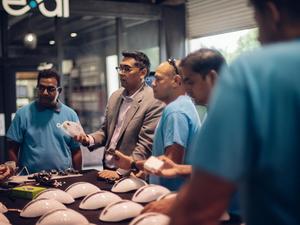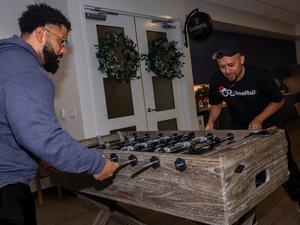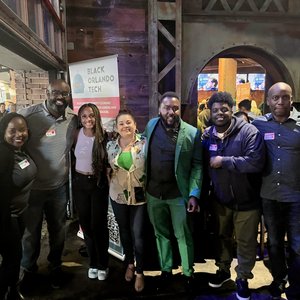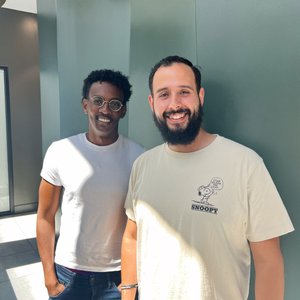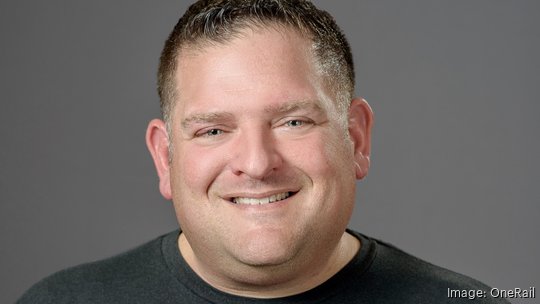
Orlando-based delivery fulfillment company OneRail, which has seen pronounced growth over the past three years, now expects to see a great deal more.
The reason? In 2023, e-commerce retail purchases are about 34% of all retail sales in the U.S., representing a revenue stream of about $385 billion. Revenue volume and number of deliveries associated with e-commerce will climb alongside growth in retail as a whole, hitting $603 billion by 2027.
Because every order must be delivered, for OneRail, these numbers mean more business. A lot more.
Established in 2018 as an on-demand moving and delivery company, OneRail make a switch in 2020, launching its OmniPoint platform, which handles fulfillment from tip to tail. The change attracted funding to the tune of about $54.5 million, and OneRail went from making 660 deliveries per day to the current 220,000 deliveries per day.
CEO Bill Catania, who said OmniPoint is evolving constantly, met up with Orlando Business Journal to discuss how customer expectations are driving new fulfillment technology and why OneRail's new partnership with Bungii announced Aug. 15 will help OneRail get stronger.
Here's what he had to say:
You recently announced a partnership with Bungii. What’s that about?
A customer can place an order and get an order confirmation, but then the product needs to get to the customer, and that involves a lot of steps. The last part of that, which is called last-mile delivery, can be the most problematic. OneRail ensures those deliveries happen with our network of courier services. Because of our partnerships, we have the largest delivery network in the world — 12 million drivers — and Bungii, which handles big and bulky package delivery, is our newest of those partners. They have 10,000 delivery vehicles nationwide that can pick up large packages and deliver them quickly.
How did you build up to this?
We used to be an on-demand moving and delivery company. It was a perpetual game of whack-a-mole around supply and demand. I can go out and get 100 delivery people, but if I don't have 1,000 orders to give them that day, they're going to become disenfranchised and they're going to leave. That's how the on-demand gig economy works. If you don't feed the beast, you lose the beast, and then how do I prove to a retailer that I have a network that's capable of handling their work? We were in that vicious cycle, and back in 2019, I decided we no longer were going to do that. We weren’t going to be an on-demand moving and delivery company anymore. We were going to be a technology solution.
That sounds like a leap. Can you explain?
It’s a long example, but it makes the point. A customer in Ocoee fills their Lowes.com cart with 10 items, and nine of them are in inventory at the Lowe’s in Ocoee, but one isn’t. That could end up in an order being canceled or multiple deliveries arriving at different times. Either way, the customer probably won’t be happy. A customer is going to wonder why a product was displayed for them if it wasn’t available. A customer might need product number 10 to make use of products three and four, but it arrives days later and the project has been held up. Satisfying customers and keeping costs reasonable involves logistics — a coordinated network where data is shared. Each player in the fulfillment process needs to have visibility on all the others. Logistics systems were hard-wired to pull from the closest store’s inventory instead of looking at all 16 Lowe’s stores in the area. For our platform, we said, let's look at the entire market, let's look at every store as a warehouse and then let's run transportation decisions against that. Let's link all the data we can and reverse engineer the entire delivery process.
Why this matters: Reverse engineering a delivery harnesses more data and factors in more considerations so that in the end, the customer gets their order faster and the retailer or manufacturer spends less getting it there.
What are the pieces of the puzzle in the delivery industry?
There are delivery orchestration platforms, tracking and visibility companies and shipping companies that fulfill from their warehouses. You need a bunch of solutions to handle the whole process. OneRail handles all of that which is what makes it end to end. It becomes cliche in startup world for companies to say, ‘We don't have a competitor.’ And we do. We have lots of competitors. They're siloed, though. None of them covers everything.

What’s OneRail going to tackle next?
We’re still in our infancy. We’ve been recognized by [Connecticut-based tech research and consulting firm] Gartner and that’s a big deal for us, but we’re just getting started. The whole industry is moving past omni-channel to something Gartner calls unified commerce. This creates a much better experience for the shopper. A customer’s engagement with the brand is tracked so the brand understands the customer’s needs and interests. If the customer is shopping on the brand’s website, products they are more likely to prefer — based on past purchases or social media engagement — appear higher in results. Shipping notifications are branded to the retailer so there is a seamless experience for the customer. No more shipping notifications from a third-party delivery company. It’s hard for the customer to connect that back to what they ordered. On the delivery side, there’s chain of custody tracking, so we know and the customer knows where their delivery is every step of the way. We have a big announcement coming about that. We constantly are releasing new features and becoming more sophisticated.
Sign up here for The Beat, Orlando Inno’s free newsletter. And be sure to follow us on LinkedIn, Facebook and Twitter.

